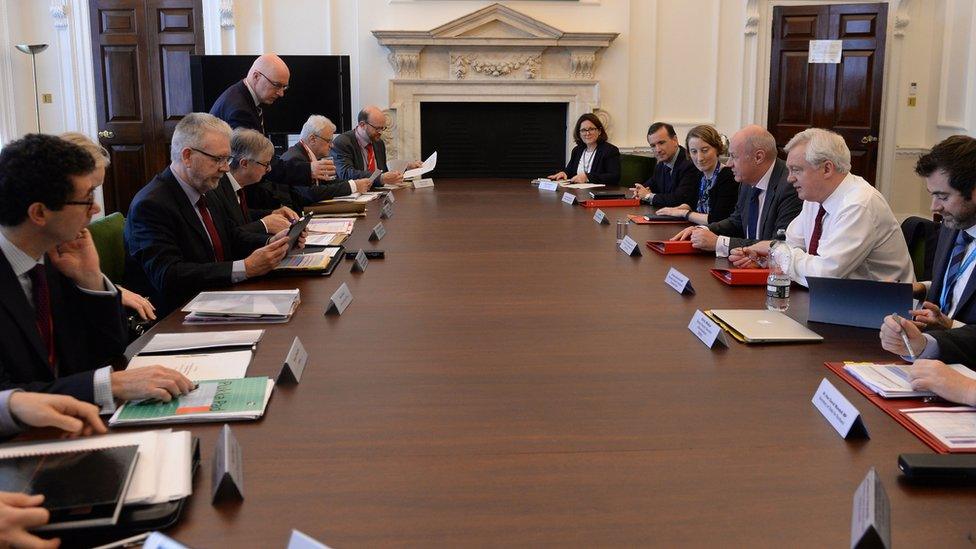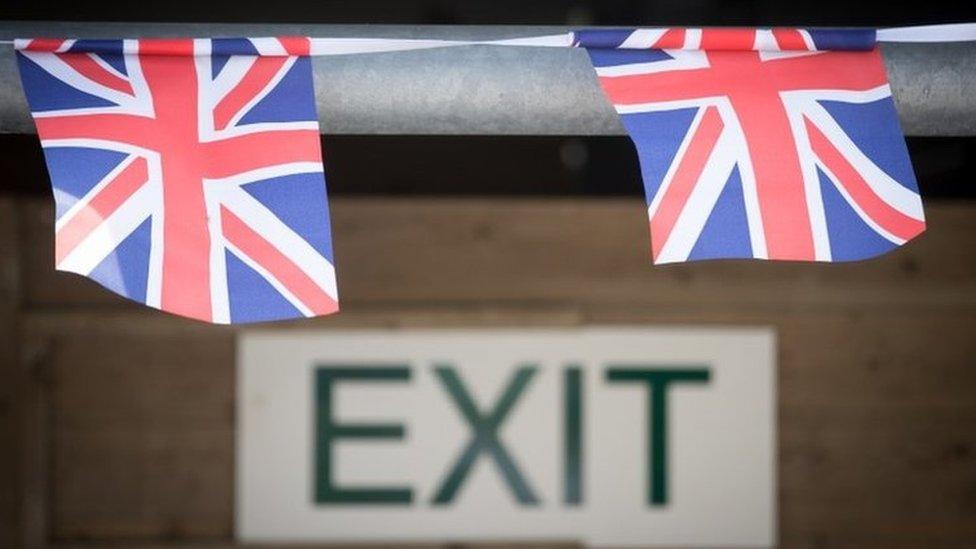'Progress' welcomed after devolved Brexit powers summit
- Published
- comments

Representatives of governments from around the UK were at the meeting in London
Progress has been welcomed following "constructive" Brexit talks between ministers from the UK and devolved governments.
The Scottish and Welsh administrations are locked in dispute with UK ministers over the EU Withdrawal Bill.
Both sides said progress had been made in the latest round of talks in London, with the principles underpinning how powers are shared out being agreed.
However, the devolved governments still want changes made to legislation.
Scottish and Welsh political leaders had been critical of delays in holding meetings of the Joint Ministerial Committee (JMC) on Europe.
A series of bilateral meetings and other talks between politicians and officials have been ongoing, but Monday's meeting was the first full JMC since February.
The devolved administrations have threatened to withhold legislative consent for the EU Withdrawal Bill unless amendments are agreed to protect their powers through the process of Brexit.
Scottish Brexit minister Mike Russell has warned that should the bill pass through Westminster without consent from Edinburgh or Cardiff, there would be "trench warfare" over all subsequent pieces of Brexit legislation.
The meeting was attended by Mr Russell, First Secretary of State Damian Green and Welsh finance minister Mark Drakeford, as well as David Sterling, head of the Northern Ireland Civil Service, who is attending following the breakdown in power-sharing.
The formal group for discussing the exit negotiations was set up to allow Scotland, Wales and Northern Ireland to have their say on the Brexit process.
UK-wide frameworks
But the UK government has faced claims it is not treating the devolved administrations with respect and of planning a Westminster "power grab" when Britain leaves the EU.
UK ministers want powers currently exercised in Brussels to be returned to Westminster in the first instance after Brexit, before some are incorporated into UK-wide frameworks and others are sent along to the devolved administrations.
The Scottish and Welsh governments do not oppose having frameworks, but want them jointly agreed, and want to maintain the presumption that any powers that are not specifically reserved are automatically devolved.

Following the meeting, both the central and devolved governments acknowledged some progress had been made.
Mr Russell said the meeting was "a tale of two halves", with the "general principles" of how power-sharing frameworks would work being agreed - but no final agreement which would see the SNP government recommend Holyrood give consent to the Withdrawal Bill.
The Scottish government is also pushing for UK ministers to give Scotland a legal say on the exit process and drop plans to leave the EU's single market.
The SNP MSP said: "I have and will continue to press for the amendments suggested by ourselves and the Welsh government to be accepted, removing the power grab and providing a clear solution that respects devolution.
"When it comes to negotiations between the UK and EU on Brexit, I have made clear that no deal is not an option that the Scottish government can or ever will support.
"We know from businesses in Scotland that a hard Brexit will cause serious and long-term economic damage and it is crucial we stay in the single market and customs union."
'Major step forward'
Scottish Secretary David Mundell said the agreed set of principles was a "major step forward" and a sign of "building momentum" towards a deal after bilateral meetings over the summer.
Mr Green also hailed the outcome of the "constructive discussions".
He said: "On the day when the UK leaves the EU, all parts of the UK need to be ready. It is the government's intention that the EU Withdrawal Bill will ensure a strong UK internal market, while safeguarding and adding to the decision-making powers of the devolved administrations.
"These principles will hopefully now pave the way to agreeing a set of frameworks that will deliver vital certainty and continuity for people and businesses across the United Kingdom."